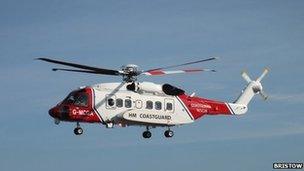Bristow Group to take over UK search and rescue from RAF
- Published

Bristow has been awarded a contract to operate helicopters in Shetland and the Western Isles
A private company will take over the UK's helicopter search and rescue operations, the Department for Transport has announced.
The Bristow Group has won a 10-year contract to run the service from 2015.
The £1.6bn deal ends 70 years of search and rescue from the RAF and Royal Navy.
Bristow will replace ageing RAF and Royal Navy Sea King helicopters with modern Sikorsky S-92s and AgustaWestland 189s.
Under the new contract, 22 helicopters will operate from 10 locations around the UK.
Ten S-92s will be based, two per site, at Stornoway and Sumburgh, and at new bases at Newquay, Caernarfon and Humberside airports.
Ten AW189s will operate, two per site, from Lee-on-the-Solent and a new hangar at Prestwick airport, and new bases which will be established at St Athan, Inverness and Manston airports.
All bases will be operational 24 hours a day, and half of the new fleet will be built in Yeovil, Somerset.
The new deal will also see Bristow take over some of the civilian search and rescue (SAR) bases currently run by the Maritime and Coastguard Agency.
Bristow Helicopters is an Aberdeen-based company, although the corporate headquarters of the Bristow Group is in Texas.
The firm has already been preparing crews for coastguard duties at Sumburgh in Shetland and Stornoway in the Western Isles.
The other current search and rescue bases are Culdrose, Wattisham, Valley, Boulmer, Portland, Lee-on-the-Solent, Chivenor, Leconfield, Lossiemouth and Prestwick.
There will continue to be an RAF base at Valley, Anglesey, but the SAR unit will be in Caernarfon.
The new service run by Bristow will be fully rolled out by summer 2017.
RAF and Royal Navy Personnel currently involved in search and rescue could be transferred to other jobs in the military when Bristow take over, said BBC defence correspondent Jonathan Beale.
However, under a programme of "managed transition" military pilots and crew will be able to apply to leave their service and take a job, if offered, with the private contractor.
The changes are not expected to directly impact the Duke of Cambridge who is due to come to the end of his tour as a search and rescue pilot at RAF Valley later this spring.
The MOD would not comment on how specific individuals will be redeployed.
'Great confidence'
The Department for Transport began the procurement process in November 2011 for providing SAR helicopter services on behalf of the Maritime and Coastguard Agency.
A previous plan to privatise the service, originally launched by the previous Labour government, had stalled earlier that year.
It wanted an all-weather SAR helicopter service able to operate throughout the UK, including mountainous terrain and at sea.
Transport Secretary Patrick McLoughlin said: "Our search and rescue helicopter service plays a crucial role, saving lives and providing assistance to people in distress on both land and on sea.
Analyst Howard Wheeldon: A lot of people's lives are at risk here
"With 24 years of experience providing search and rescue helicopter services in the UK, the public can have great confidence in Bristow and their ability to deliver a first class service with state-of-the-art helicopters."
The government says the new deal means helicopters "will be able reach a larger area of the UK search and rescue region within one hour of take off than is currently possible".
It also estimates, based on historic data, that there will be an overall improvement in flying times to incidents of around 20% - from 23 to 19 minutes.
Doubts expressed
But defence analyst Howard Wheeldon said the RAF and Navy had provided a fantastic service over so many years and most search and rescue services around the world remain in the hands of government or military.
He said: "Going to a PFI, which this essentially is, brings a lot of dangers. Callouts have gone up 40% since 2005, this is a big operation, a lot of people's lives are at risk here.
"Will the private sector operation take on the same sort of risks that the RAF, the Royal Navy and the Maritime and Coastguard Agency do, on the same scale? I rather doubt that they will.
"We've got to look at this in a wider context, are we doing the right thing in putting this in private hands, where there's a profit motive as opposed to 'let's get on and do the job' - and the military have been absolutely fantastic."
And Bob Crow, general secretary of the Rail, Maritime and Transport union, said he was "deeply concerned" that the privatisation may cost lives and risk workers' lives.
Bristow's says its helicopters and pilots have already rescued more than 7,000 people in the UK. It also operates in the Netherlands, Norway, Trinidad and Tobago, Australia, Russia, Brazil and Canada.
It said its "technologically advanced" helicopters would be operated by experienced crews with "world-class" skills. It expects to create about 350 jobs to support the contract.
- Published26 March 2013
- Published6 March 2013
- Published1 February 2013
- Published30 July 2012